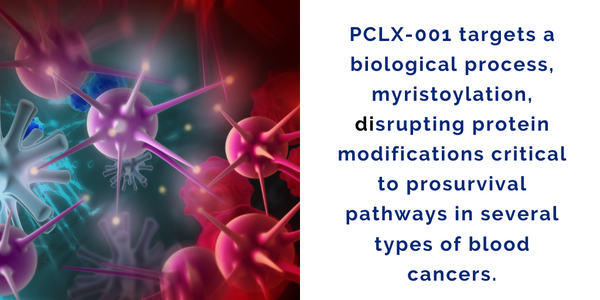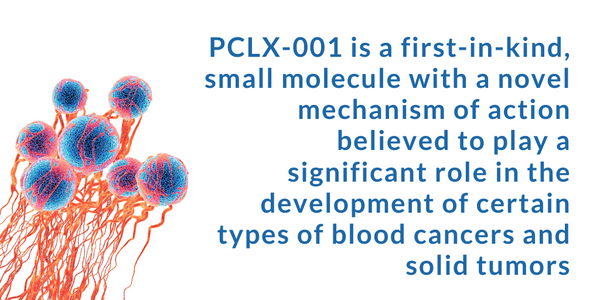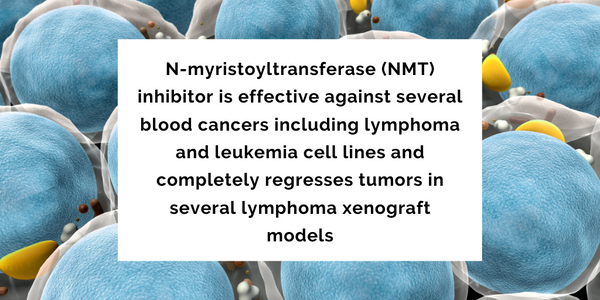Edmonton, Alberta, Canada, October 22, 2020
Pacylex Pharmaceuticals, an oncology company unlocking a new approach to cancer therapy, today announced the publication in the journal Nature Communications of data showing an N-myristoyltransferase (NMT) inhibitor is effective against several blood cancers including lymphoma and leukemia cell lines and completely regresses tumors in several lymphoma xenograft models. This report also includes mechanistic data demonstrating that inhibition of myristoylation of proteins for the B-cell receptor signalling complex, that are essential for lymphoma cell survival, leads to cancer cell death, supporting this as a new target for cancer therapy. Pacylex is developing this NMT inhibitor, PCLX-001, as a first in class therapy for various leukemias and lymphomas.
“Pacylex was founded on the insight that there is a connection between myristoylation and cancer, which presented a target that had never been fully explored or exploited for potential human therapy before,” said Luc Berthiaume, Ph.D., Co-founder and Chief Scientific Officer of Pacylex and corresponding author on the paper. “Once we found that connection, we tested NMT inhibitors and found they could selectively kill hematologic cancers at concentrations that spare normal cells.”
Dr. Berthiaume and colleagues evaluated the sensitivity of 300 cancer cell lines, encompassing all major cancer types, to NMT inhibition by PCLX-001, a potent myristoylation inhibitor originally developed at the University of Dundee. The data reported today, much of which was generated at the University of Alberta where Dr. Berthiaume is a professor in the Department of Cell Biology and member of the Cancer Research Institute of Northern Alberta (CRINA), demonstrated that PCLX-001 strongly inhibited cell growth of most types of cancer cell lines originating from solid tumors while killing most hematologic cancer cell lines. In mouse xenograft models of Burkitt’s lymphoma (BL) and diffuse large B-cell lymphoma (DLBCL), PCLX-001 produced dose-dependent tumor inhibition in all, and complete tumor regressions in 2 of 3 lymphomas. This included a complete response in a patient derived xenograft model established with lymphoma refractory to CHOP, Rituximab and other salvage therapies. This establishes proof-of-concept for NMT inhibitors as potential cancer therapeutics and supports the continued preparation for the first human clinical trial set to begin in early 2021.
A link to the publication "Targeting N-myristoylation for therapy of B-cell lymphomas" can be accessed HERE. The Alberta Cancer Foundation and the Cure Cancer Foundation both provided support for this research.
PCLX-001
PCLX-001 is a small molecule, first-in-class myristoylation inhibitor, originally developed by the University of Dundee Drug Discovery Unit as part of a program to treat African sleeping sickness funded by Wellcome Trust. Pacylex is developing PCLX-001, which has very good oral bioavailabilty, to treat cancers low in N-myristoyltransferase 2 (NMT2), a myristoylation enzyme whose deficiency is associated with higher mortality in leukemia and lymphoma. PCLX-001 selectively kills cancer cells and completely regresses (eliminates) tumors in animal models of acute myeloid leukemia (AML), diffuse large B-cell lymphoma (DLBCL) and Burkitt’s lymphoma (BL). PCLX-001 has also been shown to inhibit the growth of lung and breast cancer tumors in animal models. In tests using cultured cancer cells in vitro, PCLX-001 is at least ten times as potent as Ibrutinib (Imbruvica) and Dasatinib (Sprycel), two clinically approved drugs currently used to treat hematologic malignancies.
About Pacylex
Pacylex is a pre-clinical pharmaceutical company targeting hematologic cancers with a new first-in-class therapeutic, and is headquartered in Edmonton, Alberta, Canada. Pacylex’s technology combines new insights from Dr. Luc Berthiaume of the University of Alberta, connecting myristoylation to cancer, with a family of high quality myristoylation inhibitors Pacylex licensed from the University of Dundee in 2015. PCLX-001 is the lead drug in a new class of NMT inhibitors, enabling us to exploit NMTs as new clinical targets for cancer treatment. Pacylex completed GLP toxicology on PCLX-001 and expects to file soon for regulatory authorization to commence clinical studies in Canada in early 2021 in diffuse large B-cell lymphoma and solid tumors.
For more information:
Michael J. Weickert
CEO, Pacylex Pharmaceuticals, Inc.
E: Michael.weickert@pacylex.com
P: 650-218-1840
Twitter @Pacylex (https://twitter.com/pacylex)
LinkedIn (www.linkedin.com/company/pacylex-pharma)
Facebook (https://www.facebook.com/pacylex)
Reportable page: https://pacylex.reportablenews.com/pr/pacylex-targeting-cancer-with-novel-mechanism-and-precision-approach
#cancer, #lymphoma, #leukemia, #albertacancer, #Pacylex, #PCLX-001, #UAlberta; #UAlberta_FoMD; #Worldslongestgame; #CRINA
About Pacylex
Pacylex is a pre-clinical pharmaceutical company targeting hematologic cancers with a new first-in-class therapeutic, and is headquartered in Edmonton, Alberta, Canada. Pacylex’s technology combines new insights from Dr. Luc Berthiaume of the University of Alberta, connecting myristoylation to cancer, with a family of high quality myristoylation inhibitors Pacylex licensed the molecules from the University of Dundee in 2015. PCLX-001 is the lead drug in a new class of NMT inhibitors, enabling us to exploit NMTs as new clinical targets for cancer treatment. Pacylex completed GLP toxicology on PCLX-001 and expects to file soon for regulatory authorization to commence clinical studies in Canada in early 2021 in diffuse large B-cell lymphoma and solid tumors.








